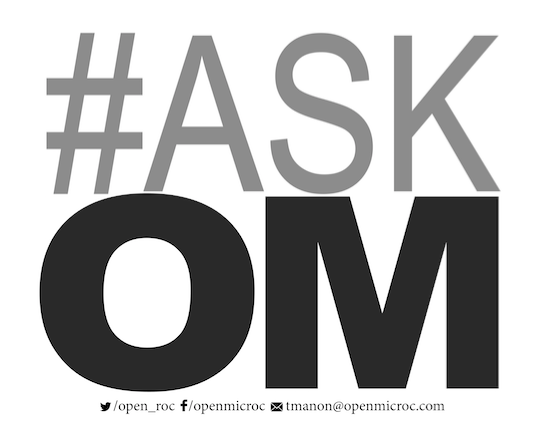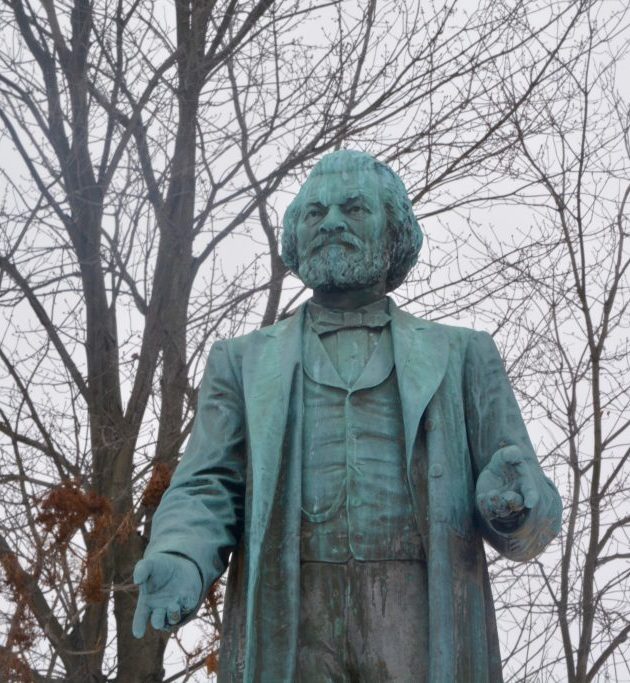
This post first appeared on Open Mic Rochester as part of its ASKOM series
By Tianna Mañón
ASKOM: Was Frederick Douglass a Republican?
This is a popular question that comes up again and again as the City of Rochester celebrates Frederick Douglass’ bicentennial year.
Open Mic partnered with CITY for a year’s worth of content and have received comments and emails asking this question. I’ll try to make this straightforward but it can get complicated. So, let’s get straight to it.
[Related] ASKOM: Is X-Men Based on the Civil Rights Movement?
Frederick Douglass was certainly a Republican, and while he waned toward the end of his life, he was vocally supportive of the political party for much of his life. He’s known to have influenced then-President Abraham Lincoln. In a 1883 letter, Douglass discussed why he’s so loyal to the party. He wrote:
I am thought to be an Independent, and so I am, but I am an Independent inside of the Republican party. I can have all the independence I want inside of the Republican party….
In politics, I am dependent upon one or the other political party, and I am foolish enough to think that the Republican party may as safely be trusted with the destiny of the Republic and the rights of the colored people as the Democratic party, and in this I know I am right. For the life of me I cannot see how any honest colored man who has brains enough to put two ideas together can allow himself under the notion of independence to give aid and comfort to the Democratic party in Ohio or elsewhere. Woe to the colored people of this country when the Republican party shall triumph in spite of the treacherous votes of colored men
My advice to colored men everywhere is to stick to the Republican party. Tell your wants, hold the party up to its profession, but do your utmost to keep it in power in State and Nation.
It’s important to understand, however, that the Republican party of his time is not the same one we see today. Lincoln was a pillar of that party, and in its 1880 platform address, Republicans talked up their involvement in strengthening the union and abolishing slaver y. They credit their party with reconstructing the Union and for pursuing “freedom instead of slavery [as] its corner-stone.” This party also believed the federal government had a responsibility for ensuring citizens’ rights are respected and defining the limits of state power.
“Whatever promises the Nation makes the Nation must perform. A Nation cannot safely relegate this duty to the States. The solid south must be divided by the peaceful agencies of the ballot, and all honest opinions must there find free expression. To this end honest voters must be protected against terrorism, violence or fraud. And we affirm it to be the duty and the purpose of the Republican party to use all legitimate means to restore all the States of this Union to the most perfect harmony that may be possible…”
Big national government? Using federal powers to bully states into better voting, housing and political representation practices? Doesn’t really sound like the Grand Ole Party, right? Knowing this, it might be a lot easier to see why Douglass aligned himself with this party. It was a party that seemingly fought for him.
[Related] Exploring Frederick Douglass’s Legacy
But it was also in the process of changing into more of the party we see today. Political experts estimate that the party began to change from the 1860’s (two decades before Douglass’s letter) into the 1930’s (40 years after his death).
Eric Rauchway is a professor of American history at the University of California. He says much of this change was already happening, but one key politician was a sure catalyst.
He says a Democratic candidate named William Jennings Bryan blurred the lines between the parties and replaced incumbent Grover Cleveland who was more conservative. Bryan, in contrast, was “young, fiery and passionate” and he thought he had a way to win back disaffected voters who felt ignored by Republicans, thereby expanding the party’s voter base. He backed the government’s role in ensuring social justice and wanted to help Southerners and Westerners who had been largely negatively affected by Republicans legislation to help railroads, blacks, banks, and the North. He proposed using federal money to help Westerners grow financially and find security too- particularly farmers.
“Republican platforms had been extremely beneficial to the North — banks grew, railroads were laid down but the West and South was struggling — particularly farmers and others in the agriculture who were hurt by the loss of slavery,” Rauchway said.
[Related] 50 Years Laters: Workers Still Fighting for Same Rights
Both parties knew Westerners were upset and tried to rally for their votes by promising similar financial help, but Democrats were more successful. And the party has since stuck with this form of helping the American little guy. That was solidified by the New Deal, a 1930’s package of legislation that helped struggling Americans find housing and achieve the middle class lifestyle.
The Republicans, in contrast, began to wane politically as Democrats snapped up Western voters and, by the New Deal, cemented themselves as “anti-big-government” when many politicians disapproved of the package.
So the takeaway? For many, it’s a lot easier to understand why Douglass and famous journalist Ida B. Wells were Republican. During their time, the party fought for a strong central government, improving the lives of blacks and back entitlements. But when Southerners and Westerners felt left behind by progress in the nation, Democrats were better able to grab these voters because of distrust for Republicans and new blood in the party.

